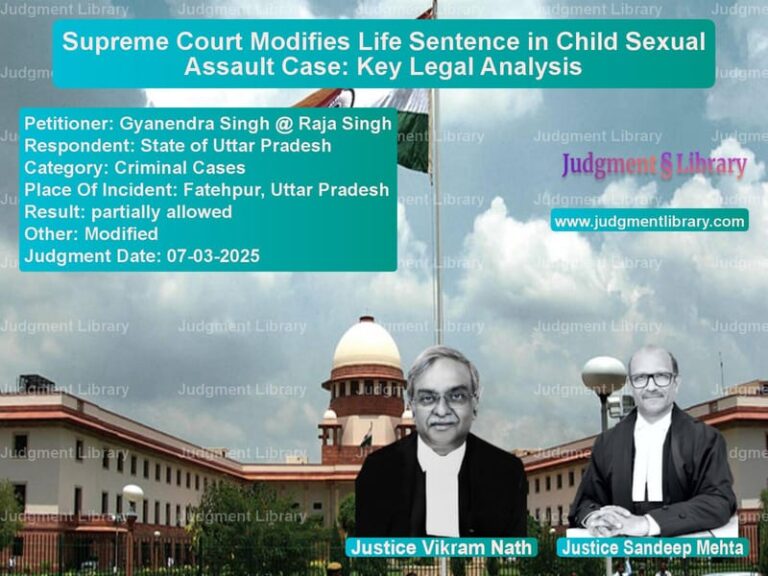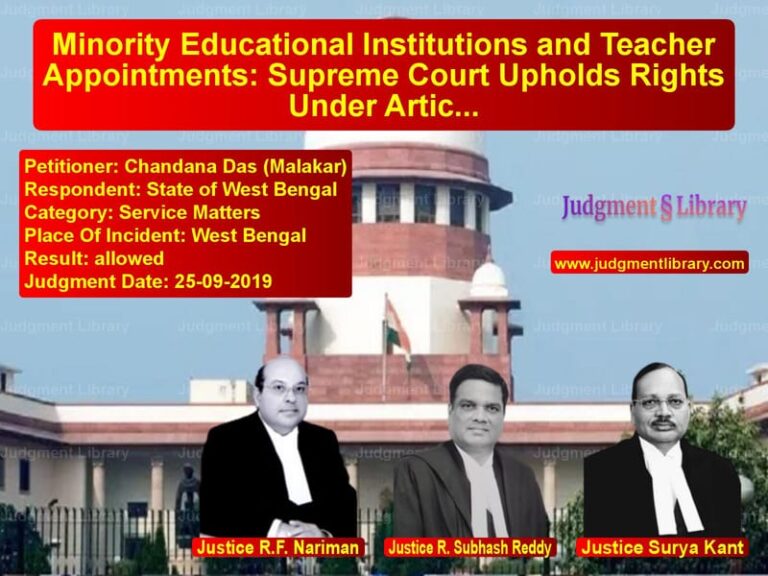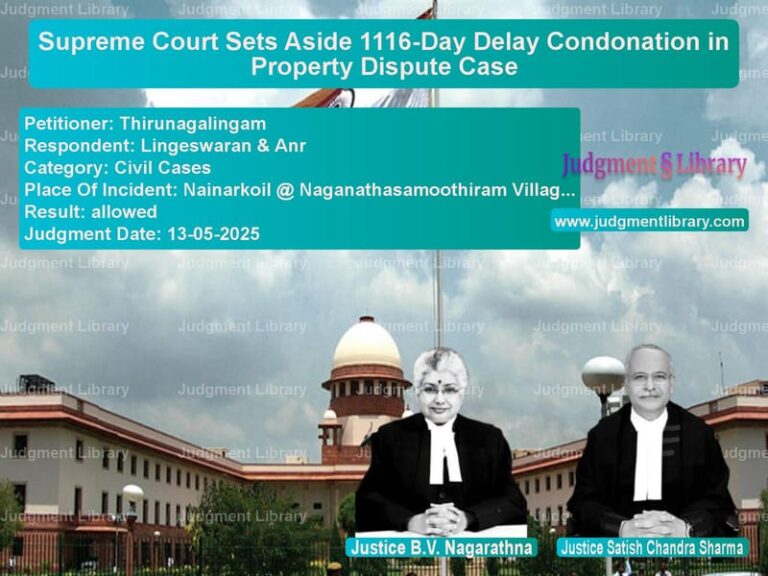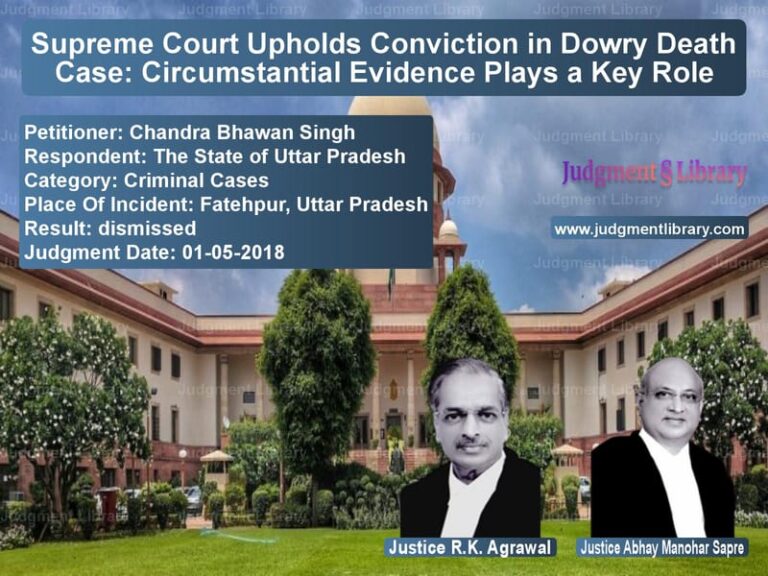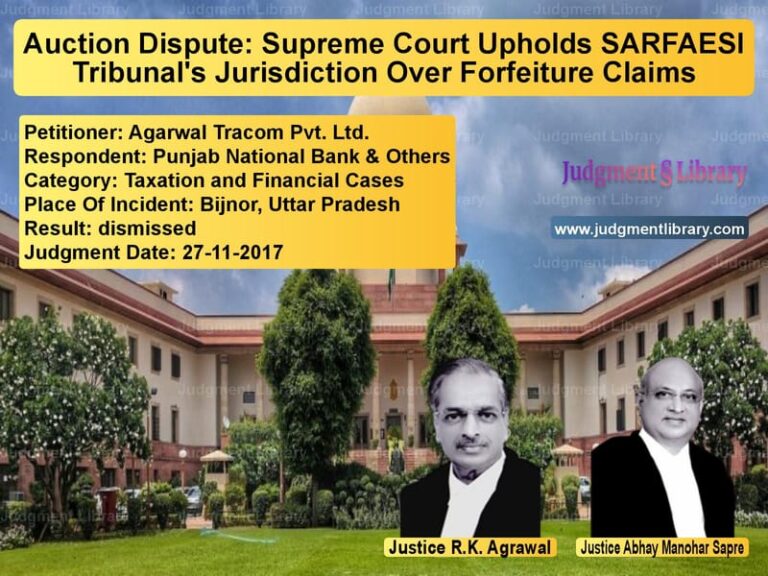Supreme Court Rules on Taxation of Capital Gains in Land Acquisition Compensation
The case of Raj Pal Singh vs. Commissioner of Income-Tax revolved around the taxation of capital gains on land acquisition compensation. The primary issue was whether the capital gains tax should be imposed in the year of notification under the Land Acquisition Act or in the year when the compensation was actually awarded.
The petitioner, Raj Pal Singh, argued that capital gains should be assessed based on the date of notification under Section 4 of the Land Acquisition Act, 1894. The respondent, Commissioner of Income Tax, contended that capital gains should be recognized only when the award is passed and possession is legally transferred to the government. The Supreme Court examined relevant provisions of the Land Acquisition Act and the Income Tax Act to arrive at its decision.
Background of the Case
The case originated from the acquisition of agricultural land owned by the petitioner in Haryana. The government issued a notification under Section 4 of the Land Acquisition Act on May 15, 1968, signaling its intent to acquire the land. The final award was passed on September 29, 1970, after determining the compensation payable.
The petitioner filed his income tax return, claiming that capital gains should be computed based on the notification date (1968), arguing that possession had already been taken. The Income Tax Department, however, assessed the capital gains for the financial year corresponding to the award date (1970), leading to this dispute.
Key Legal Issues
- When does the transfer of property take place for taxation of capital gains under the Income Tax Act?
- Does possession before the award amount to a transfer under the law?
- Does the issuance of a notification under Section 4 of the Land Acquisition Act constitute a taxable event?
Arguments by the Petitioner (Raj Pal Singh)
The petitioner contended that:
- Capital gains should be taxed in 1968 because the notification date marks the government’s intent to acquire the land, making it the point of transfer.
- The possession of the land had already been taken by the beneficiary (S.A. Jain College) under a lease agreement, thereby completing the transfer process.
- The delay in passing the final award should not delay the tax liability since the landowner lost control over the property when possession was taken.
- The Revenue had accepted similar claims in other cases for earlier assessment years and should apply the same principle here.
Arguments by the Respondent (Commissioner of Income-Tax)
The Revenue presented the following arguments:
- Under Section 16 of the Land Acquisition Act, land vests in the government only when the final award is passed and possession is formally taken.
- A notification under Section 4 merely expresses the intent to acquire; it does not constitute a transfer of ownership.
- As per Section 45 of the Income Tax Act, capital gains arise only when the transfer of a capital asset takes place.
- The case does not fall under the urgency clause of Section 17, where possession is taken immediately upon notification.
Supreme Court’s Observations
The Supreme Court made the following critical observations:
- The date of notification under Section 4 does not amount to a transfer under tax laws.
- Section 16 of the Land Acquisition Act states that land vests in the government only upon the passing of an award.
- Possession before the award does not constitute a legal transfer of ownership.
- The Supreme Court rejected the argument that prior possession affects the timing of taxation.
- The correct point of taxation for capital gains is when the award is passed, as that is when the owner is formally divested of ownership.
Precedents Considered
The Supreme Court referred to several past judgments, including:
- Commissioner of Income Tax v. Smt. Shantaben P. Mehta: This case clarified that capital gains tax is imposed only when the transaction is complete.
- Peter John v. Commissioner of Income Tax: It was held that the right to compensation does not arise until the award is passed.
- K.P. Varghese v. Income Tax Officer: This judgment emphasized that the substance of a transaction determines taxability, not just procedural actions.
Final Judgment
The Supreme Court ruled in favor of the Revenue, holding that:
- Capital gains should be taxed in the financial year when the award was passed, i.e., 1970, and not in the year of notification.
- The mere act of possession before the award does not create a taxable event.
- The notification under Section 4 does not transfer ownership; only an award under Section 11 does.
- Thus, the petitioner’s claim that the tax should be levied in 1968 was dismissed.
Implications of the Judgment
The ruling has significant implications for taxation in land acquisition cases:
- It clarifies that property transfers under land acquisition laws follow different timelines for taxation purposes.
- Landowners receiving compensation must recognize capital gains in the year when the final award is passed.
- The decision upholds the principle that taxation should be based on actual ownership transfer rather than administrative procedures.
- It prevents landowners from deferring tax liability by claiming earlier notification dates.
This landmark ruling establishes a clear legal precedent for future disputes involving land acquisition and taxation of capital gains.
Petitioner Name: Raj Pal Singh.Respondent Name: Commissioner of Income-Tax, Haryana, Rohtak.Judgment By: Justice A.M. Khanwilkar, Justice Hemant Gupta, Justice Dinesh Maheshwari.Place Of Incident: Haryana, Rohtak.Judgment Date: 25-08-2020.
Don’t miss out on the full details! Download the complete judgment in PDF format below and gain valuable insights instantly!
Download Judgment: Raj Pal Singh vs Commissioner of Inco Supreme Court of India Judgment Dated 25-08-2020.pdf
Direct Downlaod Judgment: Direct downlaod this Judgment
See all petitions in Income Tax Disputes
See all petitions in Tax Evasion Cases
See all petitions in Tax Refund Disputes
See all petitions in Banking Regulations
See all petitions in Customs and Excise
See all petitions in Judgment by A M Khanwilkar
See all petitions in Judgment by Hemant Gupta
See all petitions in Judgment by Dinesh Maheshwari
See all petitions in dismissed
See all petitions in supreme court of India judgments August 2020
See all petitions in 2020 judgments
See all posts in Taxation and Financial Cases Category
See all allowed petitions in Taxation and Financial Cases Category
See all Dismissed petitions in Taxation and Financial Cases Category
See all partially allowed petitions in Taxation and Financial Cases Category


